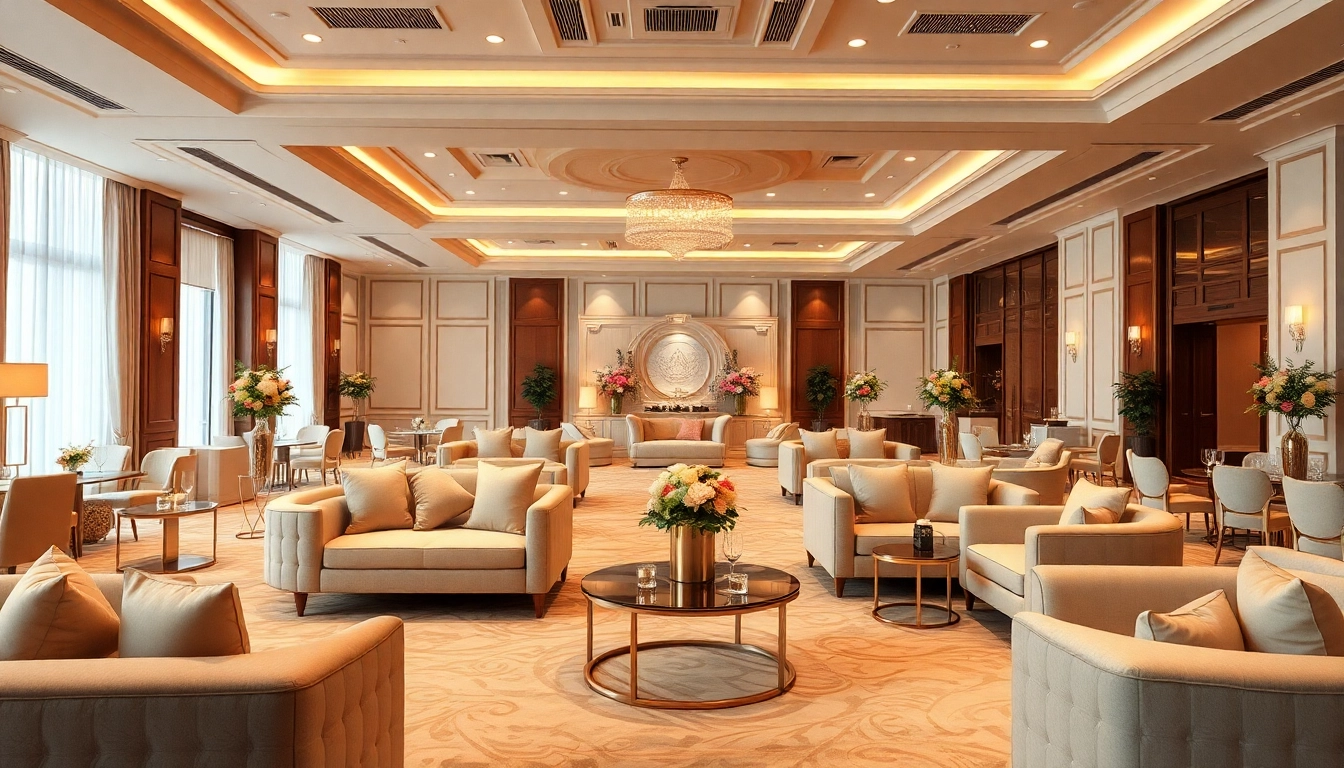Understanding Your Event Space Needs
When planning an event, one of the most crucial decisions you will make is selecting the right event space. The venue will set the tone for the entire gathering, influencing everything from the atmosphere to the logistics. To ensure that your event is successful, it is essential to understand your specific needs and preferences regarding the event space. This article delves into key factors to consider when evaluating event spaces.
Defining the Purpose of Your Event Space
The first step in choosing an event space is to clearly define the purpose of your event. Is it a corporate meeting, a wedding, a workshop, or a birthday party? Understanding the intention behind your event influences your choice of venue. For example, a corporate conference may require a space equipped with technology for presentations and networking opportunities, whereas a wedding may demand a picturesque setting with a romantic ambiance. Take time to outline the goals and objectives of your gathering to guide your selection process effectively.
Determining Guest Capacity for the Event Space
Guest capacity is another vital factor to consider when selecting an event space. Overcrowded venues can lead to discomfort, while a venue that is too large can make an event feel sparse and poorly attended. Accurately estimating the number of attendees requires consideration of several aspects:
- Nature of the Event: Is it an open invitation gathering or a more controlled event? The degree of exclusivity will affect your guest list.
- Confirmations and Trends: Analyze historical data from past events to gauge typical attendee behavior and confirm attendance patterns.
- Comfort Levels: Allow enough space for guests to mingle comfortably. Be aware of spacing and seating arrangements to avoid congestion.
Once you have a clear guest count, you can more easily narrow down suitable event spaces that can accommodate them effectively.
Location Considerations for Your Event Space
The location of your chosen event space plays a pivotal role in the overall success of your event. Accessibility for your guests should be a top priority. Consider the following when assessing location:
- Transportation Links: Ensure that the venue is easily accessible via public transport or major roads, providing convenient access for all attendees.
- Parking Availability: Ample parking or valet options can make a significant difference for guests traveling by car.
- Amenities Nearby: Consider nearby hotels, restaurants, and attractions for guests who may require accommodation or additional entertainment.
Thoroughly evaluating the location ensures that your guests can arrive stress-free, leading to a more enjoyable experience.
Features of an Ideal Event Space
Beyond basic needs, an ideal event space offers a range of features that can elevate the event experience. Here are several elements to evaluate when choosing a venue:
Essential Amenities for Your Event Space
A well-equipped event space includes essential amenities that cater to your guests and enhance the event experience. Key amenities may include:
- Audio-Visual Equipment: High-quality sound systems, projectors, screens, and Wi-Fi are vital for corporate events or presentations.
- Catering Facilities: Access to kitchens, catering staff, or on-site restaurants can simplify meal planning.
- Restroom Facilities: Adequate restroom access and cleanliness contribute significantly to guest comfort.
Aesthetic Elements in Your Event Space
The aesthetics of the event space can impact the overall atmosphere significantly. An inviting and visually appealing venue creates a more enjoyable setting for guests:
- Interior Design: Look for spaces with décor that aligns with the theme of your event, whether it’s modern, vintage, or something unique.
- Lighting: Natural lighting or adjustable lighting options can set the mood, positively influencing guest interactions.
- Scenic Views: Venues with scenic backdrops enhance photo opportunities and create lasting memories.
Flexibility and Layout of Your Event Space
Flexibility in the layout of an event space is critical to accommodate various activities and setups. When considering space layout, focus on:
- Seating Arrangements: Ensure the space can be configured for different setups—banquet, theater, classroom, etc.—according to your specific event needs.
- Breakout Areas: Having designated spaces for smaller group activities can facilitate discussions and enhance networking opportunities.
- Outdoor Access: If the venue offers outdoor areas, it can provide an excellent option for breaks or receptions.
Budgeting for Your Event Space
Understanding your budget is crucial when searching for the perfect event space. A well-thought-out budget aids in preventing overspending and ensures you allocate funds wisely across all aspects of the event. Here are critical components to consider:
Common Costs Associated with Event Space
Various costs are associated with renting an event space. Knowing these can help in budgeting accurately:
- Venue Rental Fee: This is the primary cost and can vary based on location, size, and amenities.
- Cleaning Fees: Some venues charge additional fees for cleaning before and after the event.
- Security Costs: In certain cases, security personnel may be necessary, particularly for larger gatherings.
- Insurance Requirements: Depending on the type of event and venue, you may need liability insurance costs factored into your budget.
Tips for Negotiating Your Event Space Rental
Negotiating the rental terms of an event space can result in significant savings. Here are several tips to consider:
- Research Comparable Venues: Having data on similar venues can strengthen your negotiating position.
- Consider Off-Peak Dates: Hosting your event on a weekday or during the off-season may result in lower rental fees.
- Be Open to Package Deals: Inquire about bundling services such as catering and audiovisual equipment for a better overall deal.
Exploring Budget-Friendly Options for Event Space
If your budget is tight, consider these budget-friendly strategies when seeking an event space:
- Community Venues: Local parks, community centers, or schools often have lower rental rates and can be affordable options.
- Non-Traditional Spaces: Explore venues like art galleries, libraries, or warehouses, which may offer unique aesthetics at competitive rates.
- Utilize Local Resources: Websites and services focusing on local venues can help identify hidden gems that align with your budget.
Planning an Event in Your Chosen Event Space
After selecting an event space, the next step is to lay the groundwork for a seamless event experience. Effective planning involves detailed organization and coordination:
Key Steps in Planning Your Event Space Layout
Planning the layout of the event space will directly affect guest engagement and interaction. Follow these key steps:
- Create a Floor Plan: Use software tools or sketch out the layout to optimize space usage effectively.
- Identify Key Areas: Designate areas for registration, dining, presentations, and networking.
- Consider Traffic Flow: Ensure that pathways are clear and that guests can navigate the venue easily.
Coordinating Vendors for Your Event Space
Collaboration with various vendors is essential to facilitate a smooth event. Consider the following when coordinating vendors for your event space:
- Catering Services: Choose reputable caterers that align with your event’s theme and dietary needs.
- Technical Support: Ensure audiovisual services are booked early and test the equipment before the event begins.
- Event Coordinators: Hiring an experienced planner can make vendor coordination significantly smoother.
Creating a Timeline for Your Event in the Event Space
Establishing a comprehensive timeline ensures that your event runs smoothly. Highlight critical milestones and deadlines for planning and execution:
- Pre-Event Timeline: Include preparation tasks such as setting up, checking equipment, and vendor arrival times.
- Day-of Schedule: Prepare a detailed agenda covering every segment of the event, from welcoming guests to closing remarks.
- Post-Event Review: Allocate time for clean-up and debriefing with staff and vendors to evaluate successes and areas for improvement.
Promoting Your Event Space
Once you have established your event space, promoting it effectively can increase visibility, attendance, and overall success. Here are some strategies to consider:
Using Social Media to Highlight Your Event Space
Social media platforms are a powerful tool for promoting your event space. Use these tips to maximize your outreach:
- Create Engaging Content: Post visually appealing images of the space, testimonials, and highlight events that have been successfully hosted.
- Utilize Social Media Campaigns: Run targeted ads to reach specific demographics that align with your events.
- Engage with Followers: Respond to comments and messages to foster community and create interest in your venue.
Creating Engaging Content for Your Event Space
Content marketing can increase awareness and interest in your event space. Potential strategies may include:
- Write Blog Posts: Share articles that provide tips on event planning, decor ideas, or highlight successful past events.
- Develop Video Content: Walkthroughs or virtual tours of the event space can provide a great first impression to potential clients.
- Host Webinars: Offering free sessions related to event planning can establish your expertise and promote your venue simultaneously.
Utilizing Customer Reviews for Your Event Space Marketing
Customer reviews can greatly influence potential clients’ decisions. Leverage this valuable feedback in your marketing strategy:
- Showcase Testimonials: Highlight positive experiences on your website and promotional materials.
- Encourage Reviews: After events, prompt clients to leave feedback on platforms where your venue is listed.
- Respond to Reviews: Engage with both positive and negative feedback to show your commitment to customer satisfaction and improvement.
Choosing the perfect event space is a multifaceted process that requires careful consideration of various factors—from defining the purpose and guest capacity to evaluating amenities and location. Once these elements are in place, effective planning and promotional strategies can guarantee a successful event. The insights provided in this guide will empower you to navigate the complexities of event space selection and management with confidence.



